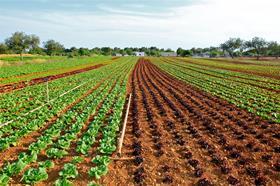
The government has sought to reassure farmers that they will at least temporarily continue to receive EU subsidies and development funding if there is no deal on Brexit.
According to a 'technical notice' issued by Defra today (23 August), eligible beneficiaries will continue to be get their Pillar 1 and 2 Common Agricultural Policy payments under the terms of a funding guarantee issued by the government in July.
Defra said it was preparing domestic legislation under the Withdrawal Act 'to ensure we have the ability in law to continue operation of payments' in a ‘no deal’ scenario.
'This legislation preserves the EU law as it currently stands, and ‘fixes’ the legislation so that it is operable once we’ve left the EU,' the notice continued.
Under domestic legislation payees will have to conform to the same standards that they do currently in order to receive their payments. This will include farm inspections, which will continue as normal.
Payment levels for both Pillar 1 and Pillar 2 will remain the same until the end of this parliament, which is expected in 2022.
In terms of rural development funding, the government informed farmers in a separate 'technical notice' that any projects where funding had been agreed before the end of 2020 would be funded for their full lifespan.
This means that if the UK leaves the EU without a deal, the British government would fund any remaining payments due after March 2019.
Defra said the guarantee also means it can continue to sign new projects after the UK leaves the EU during 2019 and 2020, up to the value of programme allocations.
'To ensure stability and continuity, the guarantee would be administered through existing national and local arrangements, modified and simplified as appropriate in line with domestic rules on public spending,' the government department added.
'Projects would need to continue to deliver good value for money and meet domestic strategic priorities.'
Despite these 'guarantees', the government said the notices were 'meant for guidance only', suggesting that growers consider whether they need 'separate professional advice before making specific preparations'.
The NFU reacted to the notices by reiterating its position that a 'cliff edge' no-deal scenario 'would be disastrous for farm businesses, the economy and society at large'.
NFU president Minette Batters said: 'While these notices are an essential part of government’s plans for preparing for all outcomes, they serve as a sobering reminder of what is at stake for farmers in the event of a no deal. The absolute priority for the NFU continues to be that we maintain free and frictionless trade with the EU.'
Food and Drink Federation chief executive Ian Wright expressed concern that there was 'no sign of further progress on negotiating frameworks with the devolved administrations', with'no substantive information on mitigating the effect of ‘no deal’ on the island of Ireland, where the implications would be most significant'.
He added: “The piecemeal release of these notices indicates that many are not yet ready and agreed for publication.That hardly inspires confidence.'



